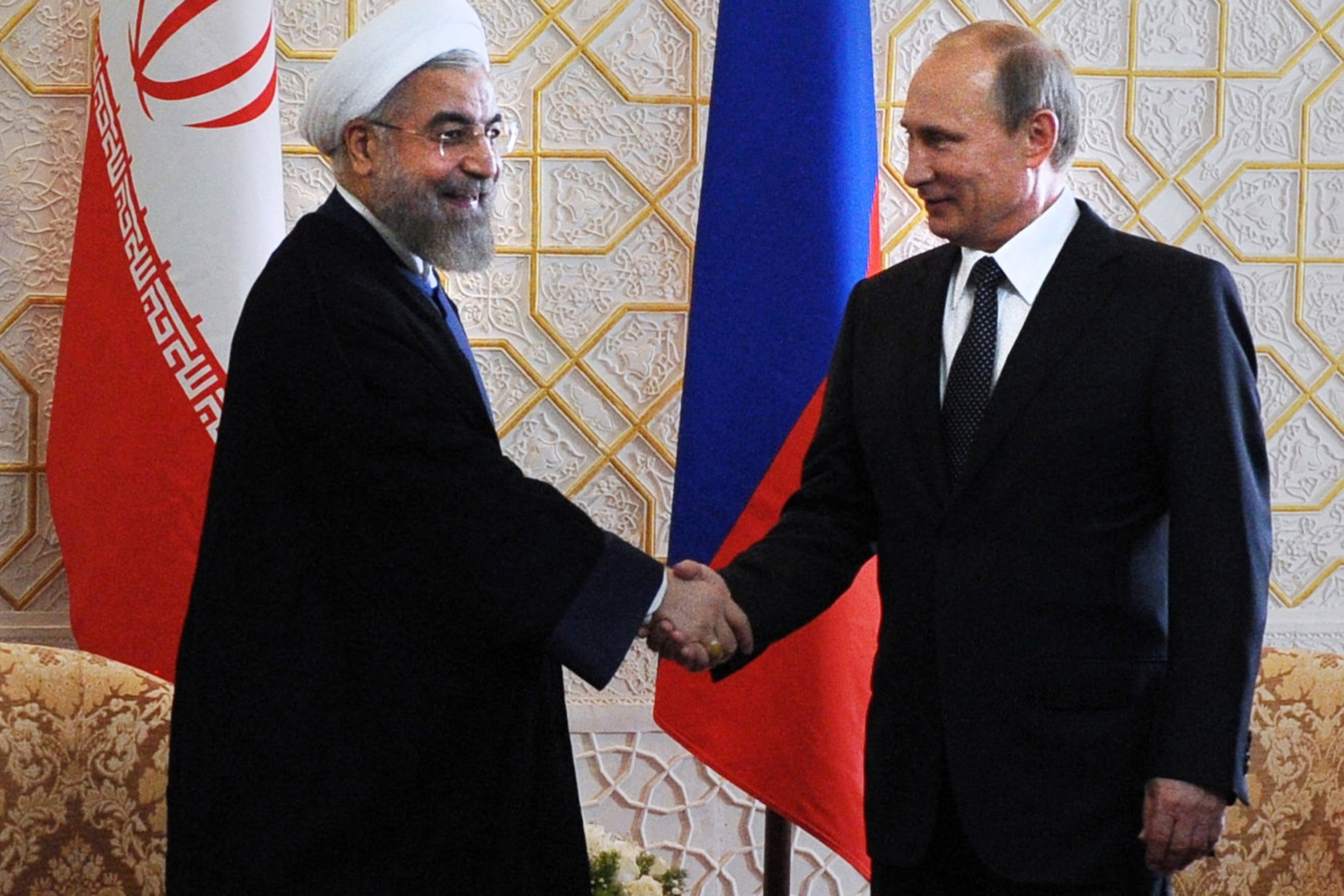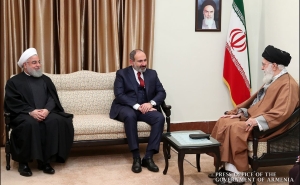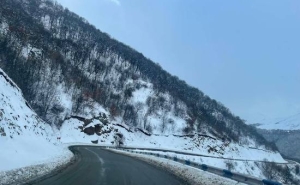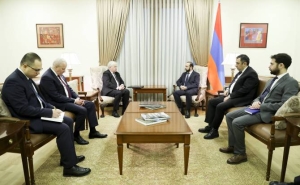Armenia’s Becoming Transit Country is in Interests of Iran and Russia

"Consulting companies are reviving old contacts, lots of signs that companies are pre-positioning themselves. One sign of the degree of interest is that it’s impossible to get a hotel room these days in Tehran," the words of Bijan Khajepour, an Iranian businessman, who, as the Guardian reports, is managing partner of the Vienna-based Atieh International consultancy, tells a lot about current situation in Tehran and growing interest from the West to restart cooperation with Iran in energy sector.
Such energy giants as France’s Total, Royal Dutch Shell, Italy’s Eni and Norway’s Statoil have already expressed their interest to reenter Iranian market and restart cooperation with Iran. In this context it was not incidental that according to the Iranian oil ministry, 1,200 Iranian companies and 600 international businesses from 29 countries such as Britain, China, France, Germany, Russia, Singapore and the United Arab Emirates attended the four-day 20th International Oil, Gas, Refining & Petrochemical Exhibition in Tehran that aimed at attracting foreign investors to Iran as the deadline for nuclear deal, June 30, is approaching.
"If sanctions are removed, many rivals will enter the Iranian market," Forsat Emrooz Newspaper quoted the predictions of Managing Director of Iran’s Pars Oil Company Hossein Vafaee. Perhaps this is the logic why Russia spares no effort to deepen its cooperation with Iran in energy sector before it is too late and Western investors manage to take leading role in Iran. Notwithstanding various predictions according to which the flow of Iranian oil onto global markets will cut the revenues of the Russian oil exports, Russia is aiming to bolster cooperation with Iran, open new business opportunities and to stymie regional rivals, such as for example Turkey, interested in investing in Iran.
Based on this logic one can easily explain the establishment of a joint working group between the National Iranian Gas Company (NIGC) and Russia’s Gazprom in 2014 that aimed at expanding ties and cooperation between the world’s gas giants. As Asghar Soheilipour, Deputy-Oil Minister and the head of NIGC recently informed Iran’s oil ministry officials had meetings with Russian companies on the sidelines of Moscow Energy Exhibition. On the occasion he particularly mentioned:
"Russians are very interested in Iran’s gas sector to participate as investors in the country’s gas projects having abandoned projects in eastern Europe; they have made a $2bn investment package, and the negotiations with Russian companies still continue," the Iranian Project reports.
Russia’s willingness to further deepen cooperation with Iran in energy sector was also expressed by the Gazprom representative, Sergey Lasutenko, during the 20th International Oil, Gas, Refining & Petrochemical Exhibition in Tehran. On the occasion the latter particularly stated:
"We have our own technologies while Iran has its own. We have a vast experience in offshore works. Gazprom is very good at sea drilling. We know that Iran has two seas: the Persian Gulf and the Caspian Sea; the Persian Gulf is very rich in oil and gas reserves and we can cooperate in this area," Iran Daily reports.
 In addition Sergey Lasutenko also referred to Gazprom's capabilities in constructing gas pipelines and noted Russia and Gazprom also have the world's largest and longest pipelines and so they can help construct high-quality equipments.
In addition Sergey Lasutenko also referred to Gazprom's capabilities in constructing gas pipelines and noted Russia and Gazprom also have the world's largest and longest pipelines and so they can help construct high-quality equipments.
Another important and inevitable development that is to be considered is that after lifting sanctions Iran is to become an oil exporter to Europe and an alternative source for Europe to get gas from. This is the development that seems to contradict Russia’s interest in the region. However, in this situation Russia can also derive its benefits. As it is known there are three potential routes Iranian gas can be exported to Europe: either through Armenian, through Turkey or through Azerbaijan. Taking into consideration the fact that Armenia is a member of the Eurasian Economic Union (EAEU) Russia and Armenia, as members of the same Economic Union, share common economic interests. Accordingly it should be within the interests of Russia that Iran exports its gas to Europe through Armenia and not through Azerbaijan or Turkey; the latter has already proved its aspirations to become major regional rival to Russia with is investments in Iran.
If one takes into consideration recent development and existing disagreements between Iran and Turkey on the one hand and Iran and Azerbaijan on the other hand, it seems that it should be within the interests of Iran as well to export its gas to Europe through Armenia, which is Iran’s closest and reliable ally as opposed to Turkey and Azerbaijan. It is well known that Turkey and Iran are on opposite camps on the crises in Syria and Yemen. The disagreements between the two countries were further escalated recently after Erdogan accused Iran of trying to dominate the region and pursuing a sectarian agenda in Syria, Iraq and Yemen. As it is known in Syria Iran supports Bashar al-Assad’s regime, while Turkey backs Syrian opposition forces and is for Assad’s giving up power. In Yemen, too, they have strong disagreements: Iran supports the Shia Houthi rebels while Turkey backs Saudi Arabia's air strikes against the Houthi forces, also known as Ansar Allah (the Supporters of God).
In addition recently it was voiced by the Iranian media that Turkey intentionally makes investment only in Atorpatkan and other Turkic-speaking communities of Iran. The same concern was also voiced by Iranian professor Shireen Tahmaaseb Hunter Washington Georgetown University. As Panorama.am, reports on the occasion she particularly noted:
"The investment from Turkey only in the Turkic-speaking communities of Iran deserves serious attention. Why do Turks make investments only in Atorpatkan or in other Turkic-speaking communities in Iran. Why don’t the Turks make investments in the South of Iran, for example in Bandar Abbas. This speaks of Turkey’s real intention behind its action."
Thus if one takes into consideration the above mentioned it seems that we have a kind of interesting triangle formed: both Armenia and Russia are going to mutually benefit if Iranian gas is exported to Europe through the EAEU area. On the other hand taking into consideration recent regional developments in the Middle East and Turkey’s controversial stance in the region, Armenia becomes the most reliable partner for Iran to cooperate with in the energy sector; the cooperation from which both countries are going to benefit both short and long perspective.
Other materials on this subject
- Putin Has Phone Talk With Iran President The political settlement in Syria was initiated by Russia, Turkey and Iran, who also vowed to act as guarantors of the settlement of the Syrian conflict.
- Iran Says Awaits US Response to Nuclear Talks 'Solutions' The negotiations, aimed at bringing the US back into the deal and Iran to full compliance with it, had stalled for about two months.
- US Prepares New Options on Iran in Case Negotiations on Nuclear Deal Fail "Because of the way that the Iranians approached and participated in the last round of talks, the President asked the national security team to be prepared in the event that diplomacy fails and to take...
- Iran Ready for Resultative Talks on Nuclear Deal — Top Diplomat "Despite the fact that the West is not implementing its commitments, Iran, for the sake of demonstrating its good will and with an eye of the lifting of the unilateral and illegal sanctions, is again ready...
- Iran Dismisses Idea of Talks with EU and U.S. to Revive 2015 Nuclear Deal The United States said it was disappointed but remained ready to “re-engage in meaningful diplomacy” and would consult with the other major powers to seek a way forward.
Other materials on this subject
- Alexander Novak: Russia reached agreement with Azerbaijan on increase of natural gas deliveries "There is an agreement with Azerbaijan to increase our supplies because they still have a gas deficit," he said.
- UN Secretary-General Condemns Attack Near Russian Embassy in Kabul The secretary-general conveys his condolences to the families of the deceased and wishes a speedy recovery to the injured.
- Russia and Iran To Introduce a Visa-free Regime The mode will be valid for groups of 5 to 50 people.
- Russia MFA: Azerbaijan-EU Natural Gas Agreement Does not Contradict Baku Allied Cooperation with Moscow Each and every country has the right to independently decide how and with whom to develop its relations, including in the oil and natural gas sector.
- The United States Announced Its Readiness For a Dialogue With Russia on the Future of Arms Control We are ready to resume dialogue with Russia to shape the future of modern arms control if Russia is ready to act in good faith.
Other materials on this subject
- Armenia gets highest growth projection by World Bank among European, Central Asian countries Regarding other regional countries, the World Bank projected Azerbaijan’s 2022 growth at 4,2%, Georgia at 10% and Turkey at 4,7%.
- IMF staff reaches staff-level agreement with Armenia on precautionary Stand-By Arrangement The proposed arrangement will support the government’s economic program to achieve investment-driven, knowledge-based, and export-led growth, while preserving macroeconomic, fiscal, and financial stability...
- Over 1 trillion in taxes paid by 1000 top corporate taxpayers in 9 months The top 1000 corporate taxpayers paid a total of more than 1 trillion 82 billion 627 million drams in the reporting period.
- S&P Global Ratings reaffirms Armenia’s sovereign ratings with "stable" outlook According to the statement, the stable economic growth of Armenia, the decline in geopolitical risks, the strengthening of Armenia’s external position and the slower rate of foreign debt accumulation...
- EBRD Raises Growth Forecast for Armenia’s Economy for 2022 In its latest Regional Economic Prospects (REP), the EBRD said that the economies of Armenia, Azerbaijan and Georgia are enjoying some of their highest growth rates in years.
-
 17:08
17:08The regular session of the Anti-corruption Policy Council takes place in Jermuk
-
 15:05
15:05The Prime Minister sends congratulatory messages to the supreme leader of Iran and the President of Iran
-
 11:11
11:11Armenia sends earthquake aid to Turkey
-
 10:43
10:43Commemoration of the Pontiff St. Sahak Partev
-
 09:16
09:16Some roads are closed and difficult to pass in Armenia
-
 19:55
19:55Phone conversation of the Foreign Minister of Armenia with the U.S. Assistant Secretary of State for European and Eurasian Affairs
-
 18:30
18:30Prime Minister Pashinyan and President Khachaturyan meet
-
 18:20
18:20Ararat Mirzoyan with Co-Chairman of the OSCE Minsk Group of France Brice Roquefeuil
-
 17:01
17:01Humans could land on Mars within 10 years, Musk predicts
-
 16:45
16:45France, US urge 'immediate' end to Nagorno Karabakh blockade
-
 16:01
16:01Blockaded Nagorno Karabakh launches fundraiser to support quake-hit Syria
-
 15:59
15:59Earthquake death toll in Turkey rises to 18,342
-
 15:43
15:43Ararat Mirzoyan Held a Telephone Conversation with Sergey Lavrov
-
 15:06
15:06French president rules out fighter jet supplies to Ukraine in near future
-
 14:47
14:475 Day Weather Forecast in Armenia
-
 14:44
14:44President Vahagn Khachaturyan wrote a note in the book of condolences opened in the Embassy of Syria in Armenia
-
 14:20
14:20Azerbaijan’s provocations impede establishment of peace and stability – Armenian FM tells Russian Co-Chair of OSCE MG
-
 12:57
12:57France representation to OSCE: Paris calls on Azerbaijan to restore freedom of movement through Lachin corridor
-
 11:40
11:40Command of Kosovo forces highly appreciated preparation of Armenian peacekeepers
-
 10:16
10:16The United States withdrew from sanctions against Syria for six months the provision of assistance after the earthquake
day
week
month
Humidity: %
Wind: km/h









